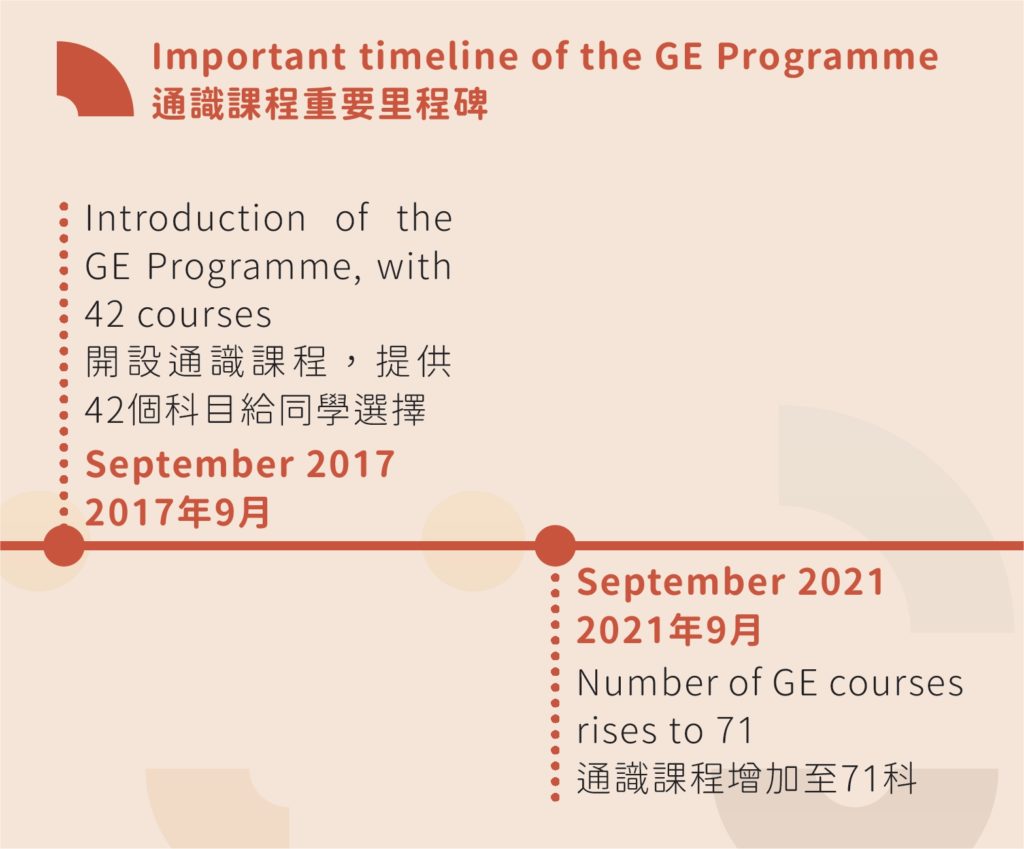Dr. CHIO Hin Ngan Floria, the Director of General Education, said that the General Education (GE) Programme of Shue Yan University have been launched for just four academic years, since the academic year 2017/2018, and has already successfully enriched the learning experience of students. In the upcoming years, more digital elements will be added to the courses of the GE Programme.
Dr. CHIO said all Shue Yan students are required to complete a total of 12 credits of GE courses, 3 credits in each of the four main areas. The four main areas are: Area 1: Chinese Culture in the 21st Century; Area 2: Communication and Literacy; Area 3: Global Citizenship; and Area 4: Interdisciplinary Perspective. Upon completion of the GE Programme, students should be able to apply their understanding of Chinese culture in different disciplines, use critical skills and media literacy for life-long learning, commit to moral and ethical behavior, and create a network of knowledge to solve problems in the contemporary world.
In the academic year 2021/2022, seven new courses have been added to the GE Programme. Four of them are communications, information, and digital technology related and belong to Area 2 (Communication and Literacy), including “Writing Apps for Both Android and iOS Mobile Phones”, “Modern Animation and Story Writing”, “Visual Culture and Art Practice”, and “Artificial Intelligence (AI) in Everyday Life.” Another three have been added to Area 3 (Global Citizenship), including “Positive Education for Well-Being in University Life”, “Basketball & Volleyball”, and “Badminton & Table Tennis.”
Dr. CHIO said in February 2021, members of the GE Programme Review Committee reassessed the courses and structure of the Programme and were generally satisfied with it. They found that knowledge coverage is sufficient and there are varieties of courses available. On the student side, according to the response of the Student Learning Experience Questionnaire (SLEQ), students were generally positive regarding the courses, with Area 3 courses being slightly more popular among the students when compared with other areas.
“Members of the committee concluded that students are more interested in experiential learning and interactive subjects. I hope that more interactivity will be added to the curriculum to increase students’ learning interests,” said Dr. CHIO.
The future development of the GE Programme is in line with the strategic goal of the University on digital humanities. Dr. CHIO said that she expects more digital elements will be added to the existing and new courses in the next five years, including VR (virtual reality) and AR (augmented reality).
“Adding the above elements to existing subjects will greatly enhance the interactivity and interest of the courses. If the response is positive, we will consider expanding the digital elements to more subjects, and even set up more courses related to information and communication technology, and data science,” said Dr. CHIO.
According to Dr. CHIO, the University is considering to make use of the content and materials of some online learning platforms, for example, LinkedIn Learning, to integrate into the GE courses for Shue Yan students. This will also allow students to enrich their learning experience by taking courses that they are interested in.
Talking about the future challenge, Dr. CHIO said that keeping abreast of modern developments has always been a major challenge for General Education Programme. It is necessary to review the course content regularly, update or modify the existing subject content to act in concert with the development plan of the University, and to help students to broaden their knowledge and to equip them to face the changes in the contemporary world.

Source:50th Anniversary Special Issue
